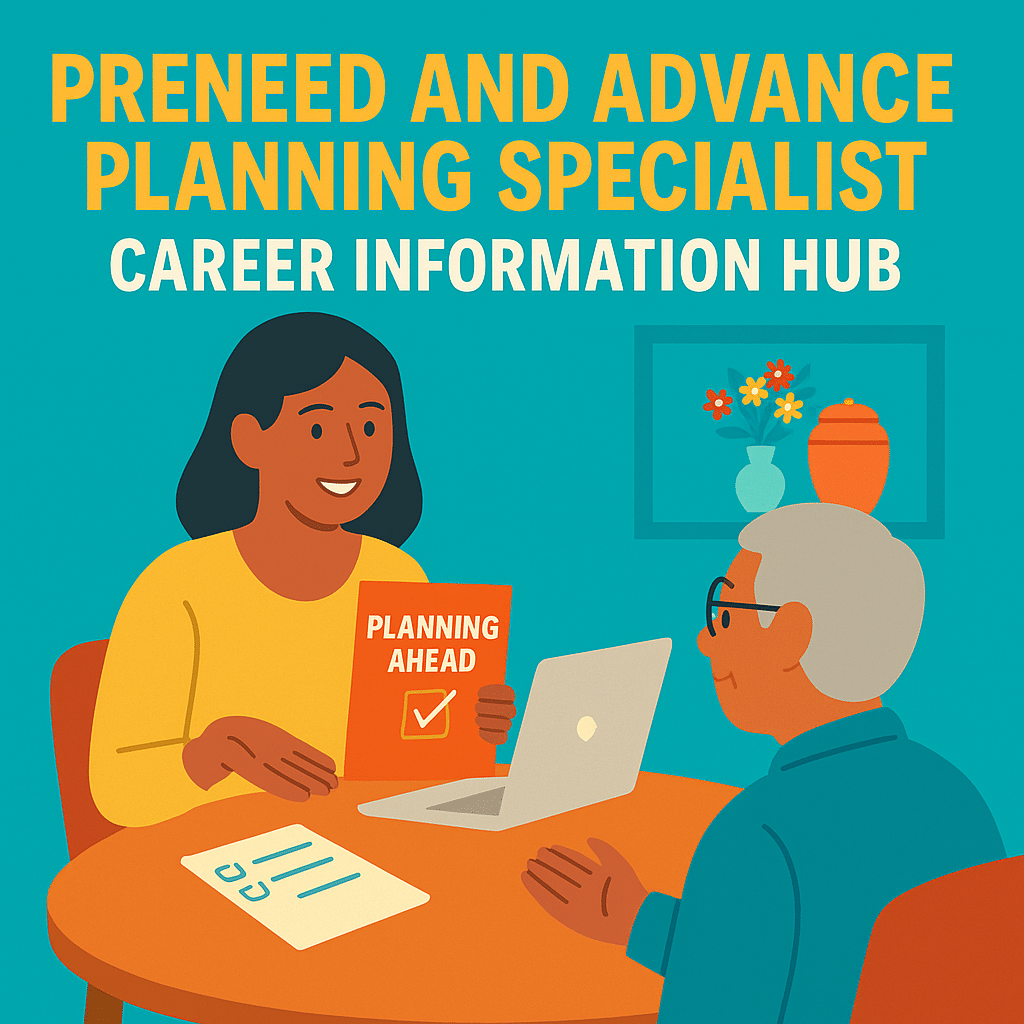Future peace of mind starts with you
The Preneed and Advance Planning Specialist Career Information Hub
Preneed and advance planning specialists help families make decisions before a crisis hits. From selecting services to easing financial stress, they guide clients through important choices long before they’re needed. This role is perfect for people who are organized, empathetic, and passionate about helping others prepare with confidence and care.

Key Things To Know
Advance planning blends service, education, and sales. These professionals often work in funeral homes, cemeteries, or with insurance-based providers.
- Understand the terminology: Preplanning means documenting your funeral or cremation wishes. Preneed refers to making legal arrangements and paying in advance. Funeral insurance is a funding method that uses a life insurance policy to cover those future costs.
- Preneed and advance planning specialists work with people before a death occurs: Clients are typically healthy and simply want to plan ahead. This gives specialists the chance to build relationships in a low-stress environment.
- It’s part sales, part service: Specialists often earn commissions and must be comfortable discussing pricing and options, but they also play an important role in helping clients understand their choices.
- There are multiple employment settings: Preneed specialists may work for funeral homes, cemeteries, cremation providers, or insurance companies offering burial or final expense policies.
- They help with funding arrangements: Many offer prepaid funeral or burial plans, set up insurance-backed contracts, or connect families with financial planning tools.
- Licensing depends on the product sold: In many states, selling preneed contracts or final expense insurance requires a license. Rules vary, especially when plans are backed by insurance or trusts.
- They often partner with funeral directors: Specialists help collect preferences and documents ahead of time, which makes things easier for funeral directors and families when the time comes.
- This role requires excellent communication: The job is all about helping people make difficult decisions in a calm, clear, and respectful way.
Why Choose This Career?
If you’re compassionate, organized, and confident having meaningful conversations, this career offers a unique way to support others while building a sustainable business.
- You help people feel empowered, not overwhelmed: Planning ahead brings peace of mind. Your work helps reduce future stress for both clients and their loved ones.
- You can build strong client relationships: Unlike other funeral roles that happen after a loss, this work allows time to connect, educate, and support people without the pressure of grief.
- It offers a balance of independence and teamwork: Many specialists work independently while still being part of a funeral home or corporate team.
- There’s growing interest in planning ahead: With an aging population and more people wanting to make their own decisions, demand for preneed planning is increasing.
- It can be financially rewarding: Many roles are commission-based, and strong communicators who build trust often succeed both emotionally and financially.
Job Responsibilities
Preneed specialists guide clients through future planning, manage paperwork, and maintain relationships over time.
- Meet with individuals or families to explore options: Whether in person, online, or by phone, your job is to listen and help people make informed decisions.
- Present service and merchandise options: Clearly explain available services, packages, and funding structures based on client goals.
- Complete contracts and documentation: Ensure legal compliance, clarity, and accuracy in all signed documents.
- Coordinate with funeral and cemetery staff: Share details and preferences with service providers so families are not left guessing later on.
- Host or attend outreach events: Participate in educational seminars, health fairs, retirement community talks, and webinars to raise awareness.
- Maintain long-term client relationships: Check in periodically, offer updates, and ensure the plan still meets the client’s needs over time.
What Are They Selling?
Preneed professionals help clients choose and fund funeral or cremation arrangements in advance. This section breaks down typical offerings and how sales work.
Types of plans sold
- Funeral or cremation service packages (with specific providers)
- Burial or interment rights (cemetery plots, crypts, niches)
- Merchandise like caskets, urns, and vaults
- Final expense insurance (life insurance policies that cover funeral costs)
- Trust-funded contracts (where money is held in a regulated account for future use)
How sales typically work
- Most specialists walk clients through different service options and price points
- Payment may be made upfront, in installments, or through a third-party insurance policy
- Contracts must comply with state regulations and often include guarantees or refund rules
- Commissions are common, especially when plans are funded through insurance
- Success is built on trust and clients choose based on the specialist’s clarity, kindness, and follow-up
Education and Certification Requirements
Becoming a Preneed or Advance Planning Specialist involves training in sales, insurance, or funeral services. Requirements vary by state and employer.
- Formal education is flexible: Most roles require a high school diploma. A background in customer service, insurance, or elder care can be helpful.
- Training is often provided on the job: Many providers offer onboarding programs or mentorship to help new hires learn the products and process.
- Licensing may be required: Selling insurance-funded plans often requires a life insurance license. Some states also require registration for trust-funded plan providers.
- Continuing education may apply: States may require yearly continuing ed to maintain licenses or stay compliant with consumer protection rules.
- Certification options exist: Voluntary programs from industry organizations can increase your credibility and help you stand out.
How To Get Started
If you’re interested in a career that blends service and sales, here are the steps to take.
- Explore job listings from funeral homes, cemeteries, and insurance companies: Many roles are entry-level and provide on-the-job training.
- Research your state’s licensing requirements: If the role involves funded plans or insurance, check what type of licensure is needed in your state.
- Practice your communication skills: Comfort talking about money, death, and planning ahead is essential to this career.
- Learn the basics of funeral and cremation planning: Familiarity with services, merchandise, and pricing builds your confidence and professionalism.
- Ask to shadow a current specialist: Observing someone in the role is a great way to decide if it’s a fit for you.
Common Myths
Advance planning can be confusing. These myths can prevent people from exploring a meaningful and rewarding career path. Let’s set the record straight.
What Makes Someone A Good Fit
You’re compassionate and comfortable talking about tough topics: Clients need someone who can talk about death without making it scary or uncomfortable.
- You’re a good listener: The best specialists ask questions, understand the client’s priorities, and tailor the plan accordingly.
- You’re motivated and self-directed: Many roles involve independent outreach and follow-up. You’ll need to manage your time and workload with professionalism.
- You’re organized and detail-oriented: Keeping accurate files and clearly written contracts is critical for making sure everything is honored later on.
- You enjoy helping people feel prepared: If you like giving people tools to face the future with confidence, this role is a natural fit.
Articles
Frequently Asked Questions
Your Content Goes Here
Disclaimer: The information provided on this website and by Buried in Work is for general informational purposes only and should not be considered legal advice. Please consult with a qualified attorney or subject matter expert for advice specific to your situation.




